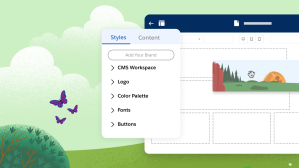Key Takeaways
- Small and mid-sized businesses are using AI agents to do things like aggregate and summarize information, reduce data-entry tasks, coach clinicians between appointments, help patients engage with their providers, and even cancel hotel reservations.
- Businesses have saved hundreds of thousands of dollars in costs and spared their employees the burden of repetitive, time-consuming tasks.
Small and mid-sized businesses (SMBs) don’t have the luxury of excess — no extra staff, no time to waste, no room for bloated processes. Competing with larger players means finding leverage wherever they can, and increasingly, that edge is coming from AI agents.
These autonomous tools don’t just automate tasks — they take action, solve problems, and extend the reach of small teams. In fact, 78% of SMBs using or planning to use AI view it as a game changer. What’s more, with agents handling high-volume and repetitive work, 85% say it can help scale operations and improve margins in ways that used to be out of reach for smaller organizations.
Agentforce, Salesforce’s digital labor platform, sits at the center of this transformation. By tapping into real-time data from CRM and external sources through Data Cloud’s zero-copy integration, it gives SMBs access to powerful AI agents that work alongside their teams to drive customer success.
Here’s how three innovative SMBs are using Agentforce to move faster, work smarter, and compete at a whole new level.
Adobe Population Health: Giving time back to clinicians
Adobe Population Health does its utmost to run lean — because it has to. Competing with larger health systems means the midsized provider must work smarter with fewer resources. So when CIO Alex Waddell noted clinicians were being bogged down by administrative duties when they needed to focus on patient care, he turned to AI agents to shift the balance — automating routine tasks so staff could focus on what matters most.
“What we really envisioned for Agentforce was a way to help aggregate and summarize data and highlight that to our staff so they don’t have to search for information,” said Waddell. “We wanted to save them time and give them time back to see our members in more detail.”
What we really envisioned for Agentforce was a way to help aggregate and summarize data and highlight that to our staff so they don’t have to search for information.
Alex Waddell, CIO at Adobe Care and Wellness
Unlike larger healthcare organizations with dedicated data teams and specialists for each function, Adobe Population Health needed a solution that would work within their lean operational structure. Implementing Agentforce allowed them to aggregate and summarize data across their systems, bringing critical information to their clinical staff without manual searching. The results have been transformative — saving nearly $800,000 annually through increased staff efficiency and avoided hiring costs while fundamentally changing how their clinicians work with patients.
“It means that they’re more present,” said Waddell. “They’re not thinking about filling out another data field. They’re just focused on those members, right there. If it saves them 15 minutes of charting, they have 15 minutes back with the member or to call the next person.”
That focus on patient care instead of data entry has delivered measurable impact. Adobe Population Health has reduced charting time (the documentation of patient visits and medical information in their system) by 75%, saving their clinical team an impressive 375 hours every week – efficiency gains that are particularly critical for an organization without the luxury of redundant staffing.
What’s more, as the organization scaled, Agentforce helped boost nurse-to member ratios from one nurse per 325 members to one per 335 members. Numerically, this might seem minor. But with a small staff of just 80 nurses, it was huge. The efficiency gain enabled Adobe Population Health to avoid hiring three additional staffers, saving about $400,000 per year in labor costs.
As Adobe Population Health expands its use of Agentforce, the team is exploring new ways to connect patients with critical resources, making help more accessible and effective. For this mid-sized provider, AI agents offer a path to overcoming long-standing barriers to patient engagement.
“When people utilize the resources we provide, their health outcomes are much better,” said Waddell. “They manage their health more effectively and require fewer urgent interventions. Sometimes the traditional way of doing things can be a barrier, and I’m hoping that Agentforce can help us break down some of those barriers for our members.”
Precina: Scaling personalized diabetes care
Precina isn’t trying to be the biggest name in healthcare — it’s trying to change a billion lives. This small, tech-forward diabetes medical clinic is using AI agents to do what larger systems still struggle with: Delivering deeply personalized, continuous care at scale.
“We work really hard to break the preconceived notion that patients deserve type two diabetes,” said Josiah Bryan, CTO and Lead AI Researcher at Precina. “But even our own human providers sometimes have tough days breaking through that.”
Bryan said that insight led to one of Precina’s first Agentforce deployments: An AI coach that helps clinicians reset emotionally between sessions. Think of it as a digital mirror that reflects empathy back at the provider, helping them show up better for the next patient.
From there, Agentforce became a force multiplier. With just one implementation, Precina saved an estimated $80,000 annually for every 5,000 patients by automating administrative tasks and streamlining care delivery. And they didn’t stop there.
With just one implementation, Precina saved an estimated $80,000 annually for every 5,000 patients by automating administrative tasks and streamlining care delivery.
Nine AI use cases are already live or in development — from navigating massive medical records to prepping patients for appointments. One agent now sifts through thousands of pages of documentation, flags key details, and summarizes them so providers can focus on care instead of just paperwork.
Another breakthrough: An agent that acts like a digital ally, helping patients — especially those in underserved communities — ask smarter questions, understand their options, and engage more confidently with their providers.
In the end, this agentic approach gives patients and providers the tools they need to connect better, decide faster, and move forward with clarity. With Agentforce, Precina is building a national model for how AI can radically redefine chronic care.
“Our goal here is not to become rich,” Bryan said. “Our goal here is to change a billion lives, improve a billion lives.”
Engine: Automating travel management to drive more value for SMBs
Engine isn’t just automating its own business with Agentforce — it’s building smarter travel solutions for other businesses that depend upon it. As a rapidly-growing platform for business and group travel, Engine has embedded AI agents into its core offering, giving SMBs access to enterprise-grade automation without the overhead.
“When you’re growing as fast as we are, it’s a scale problem,” said Engine CEO Elia Wallen. “And frankly, when you see what some of these tools can do these days, it’s just remarkable. We’ve already implemented AI in a handful of ways that make our team more efficient and we’re just getting started.”
One of the operational drains on Engine’s team is triaging member service emails. The company’s support inbox receives nearly 55,000 messages a month, which used to mean several team members manually sorting and categorizing messages every day. Not anymore.
“At the beginning, we used AI for simple things like automating the manual tasks that team members were doing every day, such as reading support emails and categorizing them,” said Wallen. “Then, we took it a step further with much more complicated processes, such as cancellations, case summarization, hotel folios, and more.”
Trip cancellations can be one of the most complex, failure-prone parts of the travel experience. Agentforce now handles the entire cancellation flow. It reads inbound requests, determines what’s needed, triggers the right internal processes, and closes the loop. No humans required.
Something that maybe took a day or two because you have to wait on various processes can now move forward much faster with better outcomes.
Elia Wallen, CEO of Engine
“Something that maybe took a day or two because you have to wait on various processes can now move forward much faster with better outcomes,” said Wallen. “When you can notify a hotel almost instantaneously about a cancellation, versus having it sit in a queue until somebody picks it up hours or days later, the chances of that hotel honoring the request are significantly higher.”
The results of these AI efforts? Double-digit productivity gains across the board and a competitive edge for the SMBs that rely on Engine to punch above their weight class. Unlike antiquated travel providers with teams doing manual work for every task, Agentforce gives Engine an edge with fast, accurate, always-on service without sacrificing flexibility or quality.
Looking ahead, Engine sees AI augmenting rather than replacing their human-centric approach. The company plans to extend AI capabilities across their platform to support SMB clients with everything from customer service to personalized travel recommendations, all while maintaining the human support that many travelers still prefer.
We’re using AI for a ton of amazing applications and we haven’t even scratched the surface yet.
Elia Wallen, CEO of Engine
“We’re using AI for a ton of amazing applications and we haven’t even scratched the surface yet,” Wallen said. “At the same time, we’ll never lose sight of ensuring that everything we do is to enhance the travel experience for our SMB customers and their travelers. When AI is used well, it’s not a ‘this or that’ situation. It’s an ‘and.’”
More information:
- See how leading companies of all sizes and industries are transforming to become Agentforce companies
- Learn why a deeply integrated platform is key to unlocking the agentic AI opportunity
- Find out how Data Cloud fuels agent-first enterprises
- Discover why AI models matter less than having a deeply unified platform
- Read why metadata is key to building a massive AI agent ecosystem

















